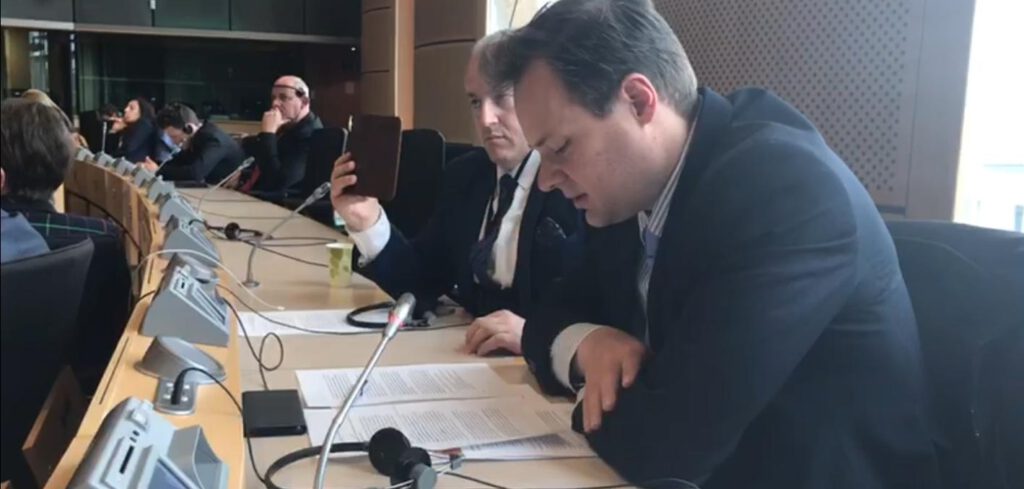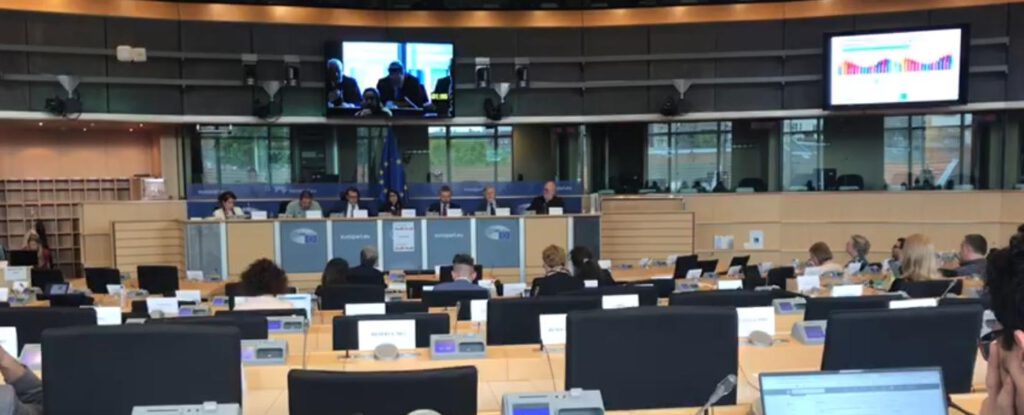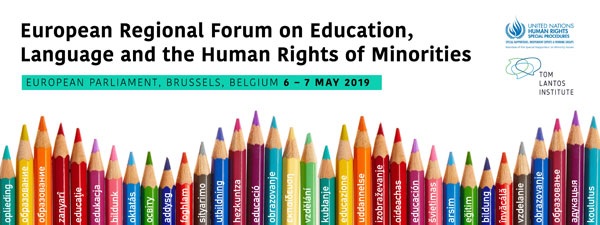On 6 and 7 May 2019, President Festim Lato, Mr. Arben Arkaxhiu and Mr. Jeroen Zandberg participated in the European Regional Forum on Education, Language and the Human Rights of Minorities and presented a statement about the situation of the Cham.
The Forum on Minority Issues is organised yearly by the United Nations (UN) in Geneva and provides an opportunity for civil society actors to address the UN, explain their grievances and provide recommendations to the international community. President Festim Lato participated in the latest session on 29/30 November 2018. At this session, the Special Rapporteur on minority issues Dr Fernand de Varennes announced that in 2019, in addition to the yearly conference, the UN would organise three regional forums in order to make the Forum on Minority Issues more accessible. The European Regional Forum is the first of its kind and was organised in the European Parliament on 6 and 7 May 2019.

On behalf of the Cham community, Mr. Jeroen Zandberg made the following statement:
Distinguished guests,
I wish to briefly explain the human rights situation of the Cham-Albanians where it relates to their ability to receive education in their own language and culture.
The Cham-Albanians are a distinct multi-religious cultural group which lived in the area of Chameria for many centuries when it was a part of the Ottoman Empire. In 1913, this area became part of Greece, despite the fact that a large part of the population identified themselves as Cham-Albanian. Subsequently, the Greek government implemented many policies which undermined the continued use and existence of the Cham-Albanian language and culture. A very important chapter in the modern history of the Cham-Albanian people was their expulsion during World War Two, when a large part of the population fled to southern Albania, where many remain until this day. This event caused the majority Cham population to become a small minority community in present day north-western Greece.
The main issue that defines the ability, or inability, for use of Cham-Albanian in education is that Greece officially does not recognise ethnic, cultural minorities; it only recognises religious minorities. The lack of recognition of cultural minorities has great consequences for the ability of the various minorities in Greece to organise themselves under the cultural banner they self ascribe to. The most successful group to further their minority rights within Greece has been the Turkish minority in Western Thrace who have over a hundred primary and secondary bilingual and multicultural schools, but only in the area of Western Thrace. These efforts were largely successful due to a high degree of self-organisation, significant international support and the ability of the Turkish minority to claim distinct rights as stipulated in the 1923 Treaty of Lausanne; rights and support that the Cham-Albanian community does not enjoy.
Furthermore, the Turkish minority in Greece shares the Muslim faith. The Cham-Albanian community however is multi-religious, without a distinct majority religion. Some are Orthodox, others Muslim while part of the community follows the Catholic faith. It is therefore not possible for the Cham-Albanian community to be recognised as a religious minority. A direct consequence of this lack of recognition is that it is not possible to set up minority schools and receive education in the Cham-Albanian language and culture.

Greece is a member of many international organisations, like the European Union and the Council of Europe. As such, it takes part in many of Europe’s institutions that govern the cooperation and implementation of the European values and ideas. However, although Greece is a member of these organisations it has failed to ratify several key international treaties which would guarantee minority rights within the country.
Greece has signed, but not ratified, the Framework Convention for the Protection of National Minorities. This treaty of the Council of Europe is aimed at protecting the rights of national minorities and obliges its signatories to enable the use of minority languages and education for national minorities. Since Greece has not ratified this treaty, it cannot be held directly accountable by the Council of Europe for not allowing the Cham-Albanian community to set up multicultural schools and receive education in their native language.
Furthermore, the European Charter for Regional or Minority Languages of the Council of Europe has not been signed or ratified by Greece either. This treaty protects and promotes the historical regional and minority languages in Europe. If Greece would have signed and ratified this treaty, it would have to guarantee a basic level of protection for the Cham-Albanian language and this would make it possible for their language to be used in education.
The failure of Greece to ratify these treaties means that minority rights have less protection than in most other European States and that the country foregoes its responsibility to be fully integrated into the European institutions.

In conclusion, the Cham-Albanian language is not present in any part of the Greek educational system. The fact that Greece only recognises religious minorities and not ethnic and cultural minorities makes it impossible for a multi-religious community like the Cham-Albanians to set up their own primary and secondary schools. Furthermore, since Greece did not ratify two crucial treaties of the Council of Europe, it cannot be held accountable by the international and European community.
The recommendation of the Democratic Foundation of Chameria is therefore:
- For the European countries to persuade Greece to sign and ratify these two treaties of the Council of Europe;
- To call upon the Greek government to accept the jurisdiction of these treaties and become fully integrated in the European institutions;
- For the Greek government to recognise cultural minorities alongside religious minorities.
Thank you.

Jeroen Zandberg and Arben Arkaxhiu 
Dr. Fernand de Varennes, UN Special Rapporteur on Minority Issues and Festim Lato
